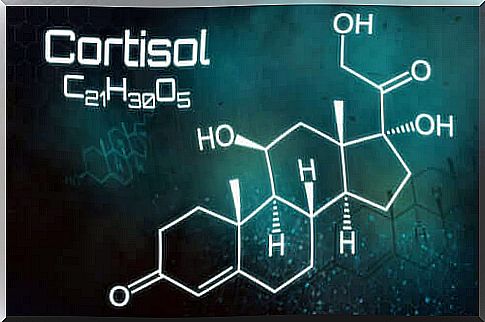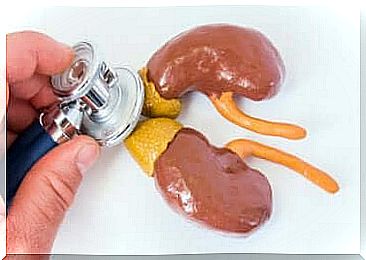What Are The Consequences Of Too Much Cortisol?
Cortisol is an important hormone in our body in stressful situations. It provides us with the necessary energy to be able to face them. However, too much cortisol can also harm the body.

Do you know what an excess of cortisol is? Our human ancestors used this increase in the hormone to escape the danger of nature, but today the functions and role of stress have changed.
Cortisol is a hormone produced and secreted by a few glands above each kidney called the adrenal glands. When the body needs more energy to perform certain tasks under stressful situations, the brain sends a signal to these glands, causing the release of cortisol.
We all have a certain level of cortisol in our blood, which depends on the situations we face. However, excess cortisol can create harmful health complications.
What are the causes of increased cortisol in the blood?
Cortisol is the stress hormone . When we go through a stressful situation, like for example a prolonged fast or the escape of a danger, this hormone is released.
On the other hand, cortisol is a hyperglycemic hormone. In other words, it directs the body to produce and release glucose. Once in the blood, the sugar can be used by the tissues for the production of energy needed in the stressful situation.
The ultimate goal of cortisol is to bring more energy to the body. In addition, it plays a role in the balance of salts and water in the body, as well as in the control of blood pressure.
At the brain level, cortisol regulates the sleep-wake cycle. Indeed, in a stressful situation, we must remain vigilant to act quickly. In addition, it contributes to the processes of memory and concentration.

What are the consequences of too much cortisol?
Prolonged fasting or running away from an animal that can hurt us are no longer real sources of stress. However, new forms of stress have appeared. They are more psychological, like stress suffered at work or during studies.
The brain does not differentiate between these types of stress and acts the same for everyone, activating cortisol. However, the actions cortisol previously performed to provide us with energy are no longer as necessary in psychological stress.
This is because cortisol fills our blood with glucose and mobilizes excess fat and proteins. In addition, it inhibits the production of insulin, the hormone responsible for the entry of glucose into cells.
High blood sugar glucose levels along with insulin resistance can lead to diabetes and cardiovascular disease. On the other hand, fat is deposited in the abdomen, thus promoting obesity.
The causes of excess cortisol, in addition to stress
Stress isn’t the only one that produces excess cortisol. There are also diseases that stimulate the adrenal glands to release cortisol in large amounts. For example :
- Cushing’s disease: the brain commands the adrenal glands to release cortisol, sometimes due to a brain tumor
- Hyperfunction of the adrenal glands: the glands are working more than they should. Either by external stimulation or by its own internal cellular mechanisms
- Ectopic ACTH Synthesis: ACTH is the signal our brain uses to activate the production and release of cortisol in the adrenal glands. Certain tumors, as well as certain cancers of the lungs, can synthesize and secrete the substance
- Iatrogenic cushing: increased cortisol may be due to chronic use of corticosteroid medications

What to do in case of excess cortisol?
The stress of everyday life raises cortisol levels beyond normal. However, if they do not reach a pathological level, there is no need for treatment. In such situations, it is more important to reduce stress through relaxation exercises or playing sports in order to use up the energy that cortisol provides us.
On the other hand, if you take corticosteroids chronically, have been diagnosed with diabetes, have osteoporosis or obesity without any explanation, it may be the excess cortisol that causes all of these. diseases.
It is therefore essential to consult a doctor in these situations, because sometimes the excess cortisol can be corrected easily. The professional will also be careful to identify different sources of this substance in tumors or organs that are not functioning as they should. He will therefore request additional examinations.









